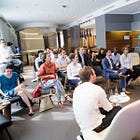Joseph Nye's Soft Power and My Hard Lessons: How My Harvard Professor's Ideas Shaped International Relations and My Career
Remembering the diplomat and scholar whose concepts of soft power transformed how nations interact—and how I view my own professional journey
Hi, I’m Jamaal. Welcome to Jamaal’s Letter, where I share personal reflections, insights, predictions, and strong opinions on the future of markets, work, business, tech, and more.
The people who read this newsletter are the people who run the world. If you aren’t yet a subscriber, consider joining them by subscribing below. Please share it with your friends and colleagues if you find it helpful:
As a graduate of the Harvard Kennedy School of Government, I've found few areas where the school stands out more than in the intellectual and policy influence of its international affairs faculty. None of those voices was more prominent than Joseph Nye — a professor, former Dean of the Kennedy School, and former Assistant Secretary of Defense for International Security Affairs in the Clinton administration — who died at 88 earlier this week.
I had the pleasure of being a student in one of Nye's classes in my final semester at HKS.
The course, Power in World Politics, explored how power operates and shifts in global affairs—across military, economic, and digital domains—focusing on the rise of non-state actors, technology, and the limits of traditional state control.
Nye was a force in shaping how we think and talk about the world today. He's widely credited with coining terms such as "soft power," the ability of nations to influence each other through attraction rather than coercion, and "three-dimensional chess," a term he first applied to the complex structure of global nation-state power.
Soft power, in particular, has not only been one of the most influential international relations concepts of the last 50 years, but the wielding of it, in small ways, has been personally meaningful to my career.
As I've written and talked about, I've been fortunate to make "professional fellowships" a meaningful part of my career. For me, they've primarily been "gatherings of ambitious professionals in the first half of their careers with public service or high-level civic engagement in their futures. They are international in scope, themed around leadership, and focused, at least in part, on professional development."
I've participated in several of these programs, including the German Marshall Fund's Marshall Memorial Fellowship, and have been named a US-Spain young leader.
A Lever of Soft Power. Fellowships function as a type of soft power, a non-coercive form of influence that countries use abroad. The term was coined by Joseph Nye, a political scientist and one of my former professors at the Harvard Kennedy School. Attracting foreign students to local universities, exporting movies and music, and sending citizens overseas to volunteer, are all examples of soft power in action. Fellowships, as a lever of soft power, can be wielded bilaterally, as is the case in the German-American fellowships in which I've participated, or multilaterally, as is the case with Global Governance Futures, a German-funded fellowship that brings together professionals from nine different countries for collaboration over the course of several years. However they are structured, these fellowships are part of a diffuse collection of programs that are designed to, over a long time frame, promote peace and cooperation between nations.
The thesis that underlies them all is that if the future leaders of these countries all know each other, like each other, view the world similarly, and share common ground on how to work together, it becomes much harder for these nations to find themselves on the path towards meaningful conflict.
The State Department's Bureau of Educational and Cultural Affairs spends more than $600 million per year promoting "mutual understanding between the people of the United States and the people of other countries." Its Fulbright Program, perhaps the world's best-known fellowship program, awards 8,000 scholarship and fellowship grants every year.
As someone who has been fortunate enough to be a part of these groups, I absolutely love them. They have become an indispensable part of my career and something I find myself committing increasingly more time and energy towards.
Indeed, Joseph Nye has been widely credited with shaping how the United States conceptualizes and wields soft power, including the justification for significant investments in the programs mentioned above. Nye's writings explicitly highlight how international exchanges and cultural diplomacy foster long-term appreciation for American values and institutions, with many alumni of such programs eventually rising to lead their home countries.
As we remember Nye's legacy, it's worth reflecting on how his ideas continue to shape international relations not just at the policy level, but in the personal trajectories of countless individuals like myself. The concepts he developed aren't merely academic frameworks—they're living strategies that build bridges between nations and create networks of understanding that outlast any single administration. In a moment when America is retreating from the world stage, Nye's emphasis on proactive and intentional international bridge-building remains not just relevant, but essential.
More on how fellowships have shaped my career





